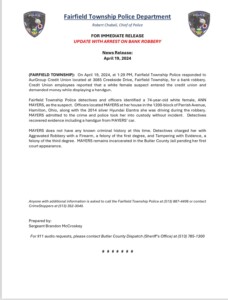A Desperate Scam Victim – Ann Mayers – Becomes A Bank Robber [UPDATED]
Ann Mayers, a Scam Victim lost her life savings and borrowed over $80,000 which she still owed. Out of Desperation, she decided to become a Bank Robber
However, the story is not as simple as it seems due to the trauma and cognitive impairment victims suffer from
Authors:
• SCARS Editorial Team – Society of Citizens Against Relationship Scams Inc.
• Portions WLWT5 News and other sources
Originally published Apr 29, 2024 – Updated October 6, 2024
About This Article
Ann Mayers, a 74-year-old Ohio woman, turned to bank robbery in desperation after falling victim to an online scam.
Police responded to a robbery at AurGroup Credit Union, where Mayers demanded cash at gunpoint. She was later found at her home and confessed to the crime, admitting recent financial losses to an unidentified online scammer. Mayers faces charges of aggravated robbery and tampering with evidence, highlighting the tragic consequences of online scams.
Such scams often leave victims traumatized, affecting their cognitive function and decision-making abilities. Victims may experience cognitive dissonance, struggling to reconcile reality with their desire to believe in the legitimacy of the scam.
Trauma triggers the brain’s emotional center, impairing executive functions like decision-making. Without professional support, these effects can persist, leading to prolonged vulnerability and potential legal consequences, as seen in Mayers’ case. Understanding the psychological impact of scams is critical for supporting victims and preventing further exploitation.

A Note About Labeling!
We often use the term ‘scam victim’ in our articles, but this is a convenience to help those searching for information in search engines like Google. It is just a convenience and has no deeper meaning. If you have come through such an experience, YOU are a Survivor! It was not your fault. You are not alone! Axios!
UPDATED: September 2024
Ann Mayers, 75-year-old woman scam victim pleads guilty to bank robbery and will be sent to prison
According to Cincinnati.com:
A 75-year-old Hamilton woman on Tuesday admitted to robbing a Fairfield Township bank and will serve prison time, court documents show.
Ann Mayers pleaded guilty in Butler County Common Pleas Court to aggravated robbery with a deadly weapon. The incident happened on the afternoon of April 19 at AurGroup Financial Credit Union.
Credit union employees told police at the time that Mayers − who was 74 and had no criminal history − walked into the bank with two bags, one of which had a gun inside, and demanded that a teller fill up the other bag with money.
Ann Mayers smiles to her sister, Linda Mayers, during an appearance in Butler County Common Pleas Court on July 16.
Mayers was arrested at her Hamilton home later that afternoon, according to an incident report. The report also says Mayers told police, “The bank, AurGroup, I did it.”Police found a total of $580, most of which was in Mayers’ car.
While Mayers was in custody, her sister, Linda, told police that Mayers had borrowed large sums of money from family and friends to send to a man she had been chatting with online.
She had borrowed at least $65,000 from a friend, Linda Mayers told police.
More:74-year-old woman charged in Ohio bank robbery needed $65K for possible scam
Aggravated robbery with a deadly weapon is a first-degree felony. Ann Mayers faces up to 12 years in prison and a maximum fine of $20,000.
Under Ohio law, Mayers will have to serve at least one year in prison because she used a gun to commit the crime.
Sentencing is set for Oct. 15 by Judge Daniel E. Haughey.
She is being held in the Butler County jail. Her attorney, David Albrecht, could not be reached for comment.
–
A Tragic Story of a Scam Victim that Became so Desperate that She Turned to Bank Robbery! A Story of a Scam Victim Turned into a Criminal
Scam Victims often lose their life savings to relationship scammers – whether it is a romance scam, a crypto investment scam, or another type of scam, the criminals involved in scams and fraud are so expert in their grooming, manipulation, and control of scam victims, that the victims become psychologically enslaved by the criminals and will do whatever is asked of them. However, unfortunately, this can leave them penniless after the scam is over.
After a scam is discovered it is very common for victims to be in distress, desperate, and traumatized. But as this case shows, the trauma from the scam can negatively affect a victim’s cognition and decision-making in profound ways.
That is what this case appears to be.
Local Police Statement
On April 19, 2024, at 1:29 PM, Fairfield Township Police responded to AurGroup Credit Union located at 3085 Creekside Drive, Fairfield Township, [Ohio,] for a bank robbery. Credit Union employees reported that a white female suspect entered the credit union and demanded money while displaying a handgun.
Fairfield Township Police detectives and officers identified a 74-year-old white female, ANN MAYERS, as the suspect. Officers located MAYERS at her house in the 1200-block of Parrish Avenue, Hamilton, Ohio, along with the 2014 silver Hyundai Elantra she was driving during the robbery.
MAYERS admitted to the crime and police took her into custody without incident. Detectives recovered evidence including a handgun from MAYERS’ car.
MAYERS does not have any known criminal history at this time. Detectives charged her with Aggravated Robbery with a Firearm, a felony of the first degree, and Tampering with Evidence, a felony of the third degree. MAYERS remains incarcerated in the Butler County Jail pending her first court appearance.
The Bank Robbery – According to the New York Post:
Trigger Warning, this report is highly judgmental and blaming of the victim.
Elderly internet scam victim accused of robbing Ohio bank with gun as a ‘remedy for her situation’
An elderly Ohio woman apparently got so desperate for cash after being duped by an online financial scammer, she robbed a bank with a handgun, according to police.
Ann Mayers, 74, of Hamilton Ohio is accused of flashing the weapon and demanding cash at the AurGroup Credit Union in Fairfield Township on April 19, the town’s police department said in a Facebook post from April 19.
Surveillance footage allegedly shows her strolling into the bank while wearing a face mask and carrying a blue bag.
The aging stick-up kid allegedly then hopped in a 2014 silver Hyundai Elantra with a stripped license plate and drove away, cops said in the post.
Detectives later found a handgun in Mayers’ car and police say she admitted to the robbery.
When cops questioned Mayers’ family members about the crime, they claimed she had recently fallen victim to a scam to send money to an “unidentified individual,” Sgt. Brandon McCroskey told USA TODAY.
“In that aspect, some may see her as a ‘victim.’ Unfortunately, Ann chose to victimize several other people in the bank by robbing it with a firearm as a remedy for her situation,” McCroskey said in an email.
If true, “[It’s] very sad and unfortunate,” he wrote.
Still, Mayers “took the time to plan this robbery” by removing her “license plate from her car” and trying to peel off a bumper sticker to go undetected, he said.
“She also reportedly spoke to family members about robbing banks in the days leading up to the robbery but the family did not take her comments seriously,” McCroskey said.
Mayers, who has no previous criminal record, was charged with aggravated robbery with a firearm and tampering with evidence.
It wasn’t immediately clear how much money she allegedly stole from the bank.
Mayers is currently behind bars at Butler County Jail.
One Tragedy Compounded with Another
According to Local News
74-year-old suspected bank robber recently lost thousands to online scammer, police say
A 74-year-old woman accused of robbing a bank in Ohio may have been strapped for cash. Police said Ann Mayers was armed as she demanded money at the bank.
Surveillance cameras captured the crime on Friday afternoon.
“The tellers in the bank, they were terrified. They saw the gun. They’re I’m sure scarred from this. It’s terrifying to be held up especially with a gun involved not knowing what the person’s intentions are,” said Brandon McCroskey, the Fairfield Township Police Sgt.
Mayers got away with $500. Police tracked her down within an hour and a half at her house in Hamilton.
Her motivation? Possibly desperation.
McCroskey said the woman had recently been scammed out of thousands of dollars from someone online. She also owed money to family and friends.
Police said before the bank heist she had no criminal history.
Mayers admitted to the crime, the police department said. While she had no known criminal history, Fairfield Township police Sgt. Brandon McCroskey told CBS News affiliate WKRC that she had recently been scammed out of thousands of dollars in an online scam and owed money to family and friends. McCroskey did not disclose the nature of the scam. McCrosky later told CBS News that Mayers’ sister “suspects” that Mayers was being scammed online, but said police have “not confirmed that.”
“I think she told me she stole a candy bar once, but other than that she’s never stolen anything. Said she doesn’t know why she did it, just out of desperation,” said McCroskey.
While some people might sympathize with the 74-year-old woman, McCroskey said she knew exactly what she was doing and had even talked about robbing a bank with her sister in the days before.
“I don’t think her sister really thought she was serious,” said McCroskey.
But she was so serious McCroskey said she tried to hide her identity by taking the license plate off her car and tried to remove a bumper sticker.
“So that suggests at least that she knew what she was gonna do and knew what she was doing was wrong,” said McCroskey.
When police arrested Mayers they found the money and the gun, which McCroskey said was loaded.
Mayers is in jail charged with aggravated robbery and tampering with evidence.
SCARS Case Analysis
By: Tim McGuinness, Ph.D. – Anthropologist, Scientist, Director of the Society of Citizens Against Relationship Scams Inc. contact@AgainstScams.org
–
In reviewing the available facts from this case, what is observed is consistent with scam victims who experienced the trauma of becoming victimized by professional expert organized criminals in financial fraud or scams.
If Ann Mayers’ scam follows the normal arc then she was expertly groomed, manipulated, and controlled by her criminals to give them everything she had. So much so that she then borrowed another $80,000 to give to them. This is the sign of a person who is psychologically enslaved by the professional criminals controlling her.
Scam victims often experience profound trauma as a result of their discovery and realization of the deception, which can have lasting effects on their cognitive function and decision-making abilities. The trauma inflicted by scams can be likened to that of other forms of psychological abuse or manipulation, leaving victims vulnerable to cognitive dissonance and significant impairment.
Cognitive dissonance occurs when individuals hold conflicting beliefs or attitudes, leading to discomfort and psychological tension – it is like a firestorm happening in their mind. With scam victims, this can manifest as an internal struggle between the reality of being deceived and the desire to believe in the legitimacy of the scammer or the promised outcome. Victims may rationalize their decisions to engage with the scam or continue sending money, despite evidence suggesting otherwise, in an attempt to alleviate this cognitive dissonance. However, this cognitive dissonance can remain after the scam is over, significantly affecting their moral compass and ability to make rational decisions.
Furthermore, the trauma experienced by scam victims can impair their cognitive function, affecting their ability to process information, understand risks to themselves and others, make rational decisions, and discern between right and wrong. This impairment may be exacerbated by feelings of shame, embarrassment, or self-blame, which can further cloud judgment and hinder critical thinking.
In terms of brain function, trauma activates the amygdala, the brain’s emotional center, triggering the fight-or-flight response and flooding the brain with stress hormones like cortisol. This heightened state of arousal can impair the prefrontal cortex, that is responsible for executive functions such as decision-making, problem-solving, and impulse control. As a result, scam victims may struggle to weigh the consequences of their actions or anticipate future risks, leading to continued vulnerability to exploitation, and what an untraumatized person would consider extremely poor decision-making.
Without professional support, the effects of trauma and cognitive impairment can persist long after the scam has ended. Victims may continue to experience intrusive thoughts, nightmares, or flashbacks, further exacerbating cognitive dissonance and impairing daily functioning. Moreover, untreated trauma can increase the risk of developing more serious mental health disorders such as anxiety, depression, or post-traumatic stress disorder (PTSD), which can compound the challenges of recovery and healing.
Unlike a normal healthy mind, victims suffering from trauma may appear outwardly normal and fully functional, but in their mind they may be unable to fully refrain from or grasp the significance of their actions as they engage in them. Yet after the fact they are remorseful and aware of what they did.
In our opinion, this is a textbook example of diminished capacity (incorrectly labeled ‘temporary insanity’.)
Most scam victims experience profound trauma that affects their cognitive functions and decision-making abilities, leading to cognitive dissonance, impairment, and other disorders. Understanding the psychological mechanisms at work in the mind of a scam victim and providing appropriate support and intervention are essential for helping victims recover and regain control over their lives. Without professional support, the effects of trauma may persist indefinitely, perpetuating the cycle of vulnerability and exploitation.
We can only hope that Ann Amyers is properly and competently defended by attorneys that understand her situation and cognitive limitations resulting from her trauma.
News Videos of Ann Mayers’ Case
Please Rate This Article
Please Leave Us Your Comment
Also, tell us of any topics we might have missed.
Leave a Reply
Thank you for your comment. You may receive an email to follow up. We never share your data with marketers.
-/ 30 /-
What do you think about this?
Please share your thoughts in a comment above!
More Related Information:
- Scam Victim Commits Crimes For Their Scammers (scamsnow.com)
- The Tragic Story Of Laura Kowal – A Romance Scam Victim Who Died Possibly At The Hands Of The Ghana/Nigerian Scammers – 2024 – [Videos] (scamsnow.com)
- Stockholm Syndrome – Getting Scam Victims To Break The Law – 2024 (scamsnow.com)
- Romance Scam Victim Steals And Gives To Her Scammer – 2024 (scamsnow.com)
- 67 Year Old Money Mule Convicted (scamsnow.com)
- Scam Victim Resistance In Support Groups Therapy Or Counseling Can Destroy Opportunities For Recovery – 2024 (scamsnow.com)
- Indoctrination Of Scam Victims By Their Scammers? Yes! – 2024 (scamsnow.com)
- Understanding Psychological Trauma: Insights For Scam Victims From Carl Jung – 2024 (scamsnow.com)
- Susceptibility To Deception/Scams/Fraud With Victims Who Also Suffer From Mental Disorders – 2024 (scamsnow.com)
- WARNING: Scam Victims Exploited By The News Media – 2024 (scamsnow.com)
- Scam Victims Avoid Or Escape The Aftermath Of Scams – How Denial And Distraction Avoid Confronting Reality – 2024 (scamsnow.com)
- The Uniqueness Of Scam Victims Or Fraud Victims – 2024 (scamsnow.com)
- Having An Identity Crisis Because Of The Scam And Loss – 2024 (scamsnow.com)
- Helping Scam Victims Understand Cognitive Dissonance – 2024 (scamsnow.com)
- Scam Victims Will Never Be The Same – A Harsh Truth – 2024 (scamsnow.com)
-/ 30 /-
What do you think about this?
Please share your thoughts in a comment above!
SCARS LINKS: AgainstScams.org RomanceScamsNOW.com ContraEstafas.org ScammerPhotos.com Anyscam.com ScamsNOW.com
reporting.AgainstScams.org support.AgainstScams.org membership.AgainstScams.org donate.AgainstScams.org shop.AgainstScams.org
youtube.AgainstScams.org linkedin.AgainstScams.org facebook.AgainstScams.org
ARTICLE RATING
TABLE OF CONTENTS
CATEGORIES
MOST POPULAR COMMENTED ARTICLES
POPULAR ARTICLES
U.S. & Canada Suicide Lifeline 988
![NavyLogo@4x-81[1]](https://scamsnow.com/wp-content/uploads/2025/04/NavyLogo@4x-811.png)
ARTICLE META
WHAT PEOPLE ARE TALKING ABOUT LATEST SITE COMMENTS
See Comments for this Article at the Bottom of the Page
on Substance Abuse Susceptibility And Scam Victims – 2024: “It is understandable how some would feel that alcohol or substance abuse would be helpful in handling their feelings after…” Jul 1, 20:36
on Scam Victims Use Work To Avoid Healing: “The last 6 years have been the most difficult of my life. The pandemic, having both parents in the hospital…” Jun 29, 18:38
on Entitlement Mentality And How Scam Victims Often Lose Their Path To Recovery – 2024: “Thank you for this discussion of entitlement. I can see from the descriptions listed that I have not felt entitlement.…” Jun 29, 18:22
on Samurai Wisdom and Rituals for Clearing the Mind After Scam Trauma – 2025 – [VIDEOS]: “A great guide on how to move forward in our recovery process with a calm mind, cleansed on an ongoing…” Jun 28, 07:34
on Delayed Gratification and Patience in Scam Victim Recovery – 2025 – [VIDEOS]: “We want to recover quickly and… we make new mistakes. How not to speed up the recovery process, how to…” Jun 28, 06:41
on The Unique Injury Of Betrayal Trauma On Scam Victims – 2024: “Primarily because you did not see it coming” Jun 27, 23:57
on Changes In A Scam Victim’s Life: “I really detest the way my trust in others has been affected by the scamming I went through. I used…” Jun 27, 14:47
on The Unique Injury Of Betrayal Trauma On Scam Victims – 2024: “Betrayal Trauma is the worst feeling ever. Why does it seem so much worse when a scammer does that to…” Jun 27, 14:34
on EMDR Therapy For Scam Victims’ Trauma – A Part Of The Recovery Process For Many – 2024: “Very comprehensive article explaining all aspects of EMDR. I’d only heard of it before and now I have a much…” Jun 26, 19:01
on Forgiving Yourself After Surviving a Romance or Investment Scam – 2025: “Thank you for this valuable article. Self-forgiveness was for me the biggest step that led to my recovery. That also…” Jun 26, 17:28
on Counseling And Your Native Language: “These points make perfect sense. I can’t imagine trying to express complex emotions in a second language. I realize many…” Jun 26, 16:05
on Thought-Terminating Cliches – How What You and Others Say Stops Critical Thinking and Recovery for Scam Victims – 2025: “I didn’t realize that these “innocent phrases” clichés ending thoughts, can have such effect / negative -inhibiting / on our…” Jun 26, 14:48
on Scam Victim Resistance In Support Groups Therapy Or Counseling Can Destroy Opportunities For Recovery – 2024: “Working with either a support group or therapist to me means a self commitment to actively participating in the therapy.…” Jun 24, 21:01
on ‘I Just Want To Forget It’ – Denial & Avoidance Are Natural But Will Not Help Scam Victims On Their Path To Recovery From Scams – 2024: “My financial loss, the shock and betrayal of the crime ending all combined to fray my nerves and spend hours…” Jun 24, 20:10
on You Hate Being Told What To Do? How Your Rebellious Mentality Can Sabotage Your Recovery – 2025: “I am a bit of a rebel, and the moment someone tells me to do something, worse, does it even…” Jun 24, 15:04
on You Hate Being Told What To Do? How Your Rebellious Mentality Can Sabotage Your Recovery – 2025: “You are very welcome” Jun 24, 03:01
on You Hate Being Told What To Do? How Your Rebellious Mentality Can Sabotage Your Recovery – 2025: “This is a great article, which makes perfect sense as to why anyone would resist the help offered to them.…” Jun 23, 20:01
on Scam Victims’ Responsibilities – 2021 [Updated 2025]: “Thank you for this article. As I continue my journey, I focus on the here and now and let the…” Jun 21, 16:26
on Scam Victims Avoid Or Escape The Aftermath Of Scams – How Denial And Distraction Avoid Confronting Reality – 2024: “In the earliest days after my crime I felt powerless, helpless and weak. I had been through so much in…” Jun 21, 14:46
Important Information for New Scam Victims
Please visit www.ScamVictimsSupport.org – a SCARS Website for New Scam Victims & Sextortion Victims
SCARS Institute now offers a free recovery program at www.SCARSeducation.org
Please visit www.ScamPsychology.org – to more fully understand the psychological concepts involved in scams and scam victim recovery
If you are looking for local trauma counselors, please visit counseling.AgainstScams.org
If you need to speak with someone now, you can dial 988 or find phone numbers for crisis hotlines all around the world here: www.opencounseling.com/suicide-hotlines
Statement About Victim Blaming
Some of our articles discuss various aspects of victims. This is both about better understanding victims (the science of victimology) and their behaviors and psychology. This helps us to educate victims/survivors about why these crimes happened and not to blame themselves, better develop recovery programs, and help victims avoid scams in the future. At times, this may sound like blaming the victim, but it does not blame scam victims; we are simply explaining the hows and whys of the experience victims have.
These articles, about the Psychology of Scams or Victim Psychology – meaning that all humans have psychological or cognitive characteristics in common that can either be exploited or work against us – help us all to understand the unique challenges victims face before, during, and after scams, fraud, or cybercrimes. These sometimes talk about some of the vulnerabilities the scammers exploit. Victims rarely have control of them or are even aware of them, until something like a scam happens, and then they can learn how their mind works and how to overcome these mechanisms.
Articles like these help victims and others understand these processes and how to help prevent them from being exploited again or to help them recover more easily by understanding their post-scam behaviors. Learn more about the Psychology of Scams at www.ScamPsychology.org
SCARS INSTITUTE RESOURCES:
If You Have Been Victimized By A Scam Or Cybercrime
♦ If you are a victim of scams, go to www.ScamVictimsSupport.org for real knowledge and help
♦ Enroll in SCARS Scam Survivor’s School now at www.SCARSeducation.org
♦ To report criminals, visit https://reporting.AgainstScams.org – we will NEVER give your data to money recovery companies like some do!
♦ Follow us and find our podcasts, webinars, and helpful videos on YouTube: https://www.youtube.com/@RomancescamsNowcom
♦ Learn about the Psychology of Scams at www.ScamPsychology.org
♦ Dig deeper into the reality of scams, fraud, and cybercrime at www.ScamsNOW.com and www.RomanceScamsNOW.com
♦ Scam Survivor’s Stories: www.ScamSurvivorStories.org
♦ For Scam Victim Advocates visit www.ScamVictimsAdvocates.org
♦ See more scammer photos on www.ScammerPhotos.com
You can also find the SCARS Institute on Facebook, Instagram, X, LinkedIn, and TruthSocial
Psychology Disclaimer:
All articles about psychology and the human brain on this website are for information & education only
The information provided in this and other SCARS articles are intended for educational and self-help purposes only and should not be construed as a substitute for professional therapy or counseling.
Note about Mindfulness: Mindfulness practices have the potential to create psychological distress for some individuals. Please consult a mental health professional or experienced meditation instructor for guidance should you encounter difficulties.
While any self-help techniques outlined herein may be beneficial for scam victims seeking to recover from their experience and move towards recovery, it is important to consult with a qualified mental health professional before initiating any course of action. Each individual’s experience and needs are unique, and what works for one person may not be suitable for another.
Additionally, any approach may not be appropriate for individuals with certain pre-existing mental health conditions or trauma histories. It is advisable to seek guidance from a licensed therapist or counselor who can provide personalized support, guidance, and treatment tailored to your specific needs.
If you are experiencing significant distress or emotional difficulties related to a scam or other traumatic event, please consult your doctor or mental health provider for appropriate care and support.
Also read our SCARS Institute Statement about Professional Care for Scam Victims – click here
If you are in crisis, feeling desperate, or in despair, please call 988 or your local crisis hotline.
More ScamsNOW.com Articles
A Question of Trust
At the SCARS Institute, we invite you to do your own research on the topics we speak about and publish. Our team investigates the subject being discussed, especially when it comes to understanding the scam victims-survivors’ experience. You can do Google searches, but in many cases, you will have to wade through scientific papers and studies. However, remember that biases and perspectives matter and influence the outcome. Regardless, we encourage you to explore these topics as thoroughly as you can for your own awareness.
























![scars-institute[1]](https://scamsnow.com/wp-content/uploads/2025/04/scars-institute1.png)
![niprc1.png1_-150×1501-1[1]](https://scamsnow.com/wp-content/uploads/2025/04/niprc1.png1_-150x1501-11.webp)

Speechless 😶